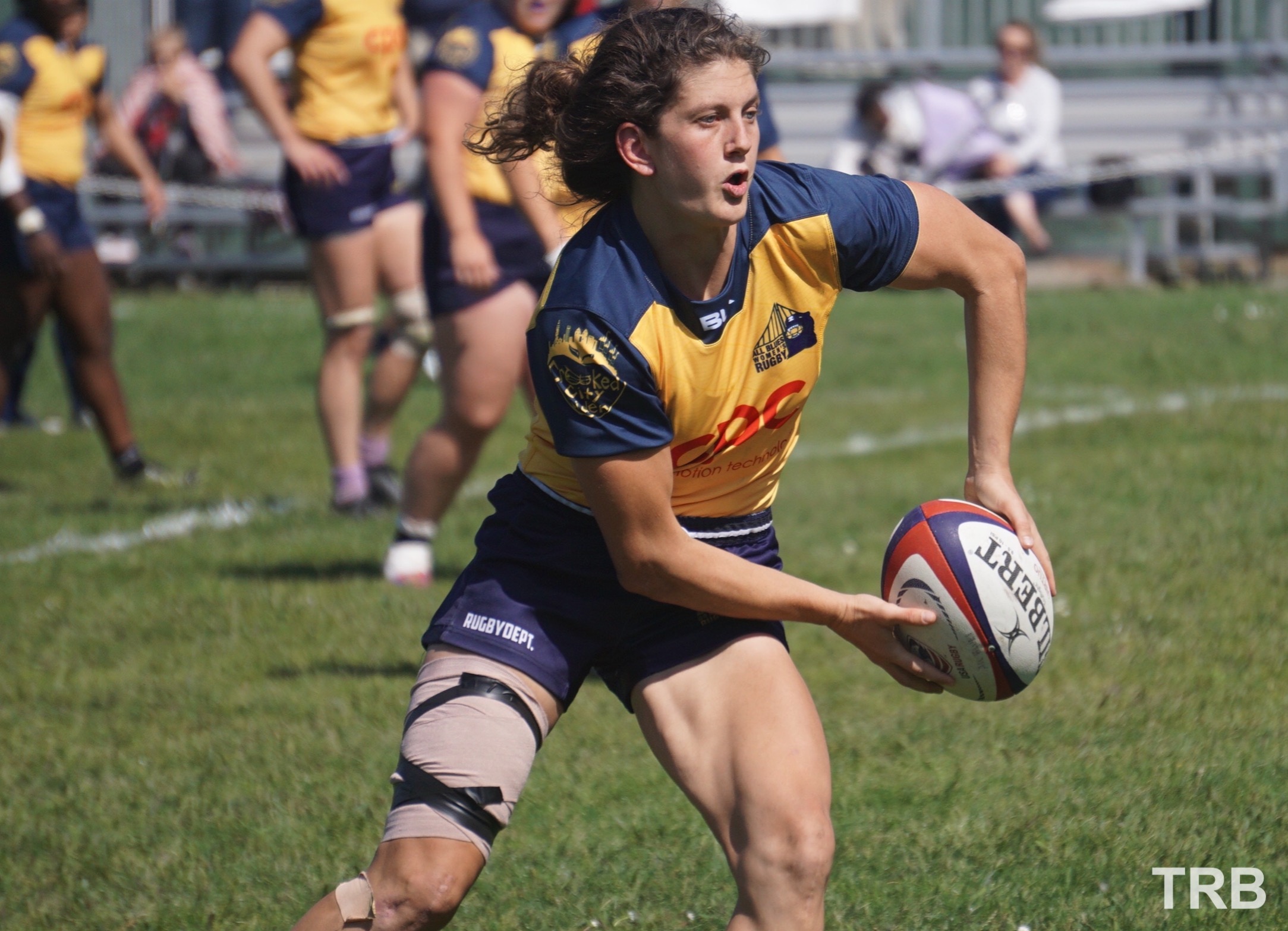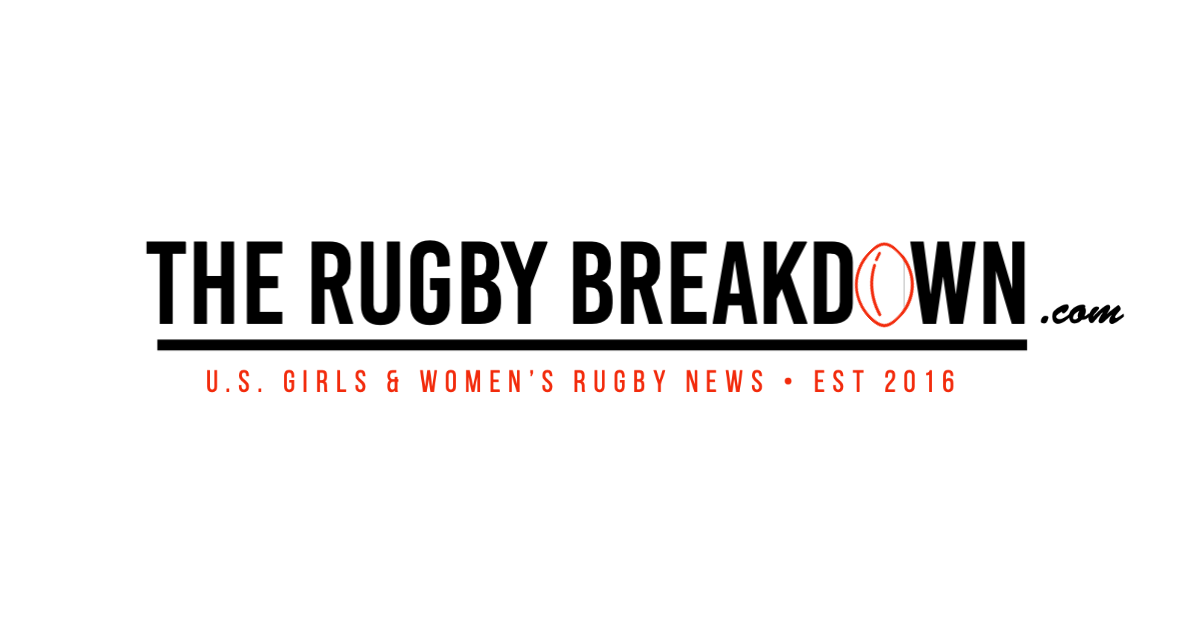
Evan Hoese / Photo: Jackie Finlan / TRB
On June 14, USA Rugby announced the return of the Club 7s National Championship for Aug. 13-15 in Tukwila. Wash. While there was relief in seeing a semblance of “normal” on the rugby calendar, teams had to check that joy against the status of its members, and for many, a championship push didn’t align with needs and goals right out of a pandemic.
Berkeley is a team that one might expect to see in Seattle this August, but All Blues stalwart Evan Hoese confirmed that the Northern Californians will not be competing.
“We were pretty – not hesitant to come back, but we took a lot of precautions,” Hoese said of progressing through Return to Play protocols. “We weren’t planning on a 7s season, because so much was in the air and we didn’t know when California was going to reopen.”
California fully reopened on June 15, and Berkeley and Life West used the opportunity to play a 15s friendly shortly afterward. The All Blues then scoured the region for 7s tournaments, while deciding the foci for their first season in a year-and-a-half.
“We reached out to the whole club that we were having a 7s town hall and invited anyone interested in participating to come and voice their opinions,” Hoese said. “We told everyone what was going on with nationals and qualifiers and the process we’d go through. There was a lot of discussion. … Everyone acknowledged that we probably could put together a competitive 7s team but the question was really about putting that level of pressure on ourselves and the coaches to force something to happen. Ultimately we decided that we still wanted to play in some competitive tournaments but really the focus was getting everyone involved.”
Berkeley took two sides to Santa Monica, finished second at ORSU’s Roy Lucas 7s in Portland, and when it competed locally, had the numbers to help motley sides. Hoese is the NorCal Rugby Union (NCRU) Women’s Division Coordinator and noted new teams in Reno’s Battle Born Babes, Chico and East Palo Alto, all of which competed this summer.
“In our role as the NCRU, especially, it’s: How can we support these teams so they can continue on,” Hoese posed. “It’s always great to see a new team start up, but what you want is their infrastructure, so they come back year after year. So for us, the next step for brand new clubs is making sure the administration and coaching and players are in place, so they can continue on and be competitive.”
Berkeley and Life West, which is planning on attending nationals, are also readying their organizations for a shift. With the WPL season moving from the fall to the spring, the clubs will have both their WPL and DII sides competing during the same half of the year.
“I can see challenges and a potential boon in some ways,” Hoese looked ahead. “It’s going to be challenging now because everything is condensed in the spring. You can’t have as many players split between two seasons or shared between two seasons. There’s an investment in resources, too. If both teams are gone on the same weekend and going to two different places, how do you divide your resources?
“But I see some potentially exciting components,” Hoese continued. “For us, it’s the flow of the DII season [January-April] into the WPL [April-June]. It could be a good thing for cusp players to build and grow and try to compete in the WPL season. No idea what the eligibility for that looks like. Historically we’ve always punished cusp players in a way where we want to get them playing at a higher level, but more than 90 minutes [in the WPL] and you can’t play back in DII. That part’s really exciting. And also I think we could use it as a development pathway for our coaches. They could focus on DII from January-April and then flip over as a support coach for the WPL.”
Development and engagement are also central to Hoese’s proposal for the fall. As the WPL side readies for competitive friendlies against its West Conference compatriots, she hopes a series of 15s jamborees will build momentum in the local club ranks. NCRU also intends to continue its work with DEI initiatives – empowering women’s teams and getting more representation in the referee pool – and coach development, building on the good energy from the L300 classes that occurred earlier in the summer.
“It was a good time to step back and really invest in our union and clubs, which I think is what teams are really paying for – to play, of course, but to also further develop their club and competition in our area,” Hoese closed.
Across the country, teams like Philadelphia are in the same headspace in terms of the summer’s role as a primer for more rugby to come. Traditionally, Philly would have joined the Mid-Atlantic Conference (MAC) club 7s series during the summer, alongside nationals-bound teams like Scion and NOVA, but not this year.
“When I arrived, everyone was doing their own thing working out wise, and got together for a lot of cardio and fitness as CDC guidelines allowed,” said James Brunson, who joined Philadelphia as 7s coach and assistant 15s coach this past spring. “They had a Return to Play committee made up of health professionals on the team, and they came up with a plan – no balls, to being able to pass the ball, to playing tag, and then full, regular contact. It’s been a transitional process, and we had clearance for full-on contact in mid-May.”
Brunson relied on 15s coach Kristin Aliberto, captains Becca Silver and Rachel Lambert, and player Kate Janssen (who is also Brunson’s assistant coach with the North Philly Nomads) to integrate him into the flow of the team while keeping players engaged and safe.
“We decided to go social this summer, because we really wanted to take time to ease back into full-on rugby,” Brunson said. “Plus, with me just coming on as a coach and putting in a new system of 7s, we wanted to focus on the transition.”
Philadelphia competed in the Firebird 7s, Harrisburg 7s and capped the summer with the Surfside 7s. After a week’s break, the team will reassemble in 15s mode and prepare for Can-Ams in Saranac Lake. Come league season, Philly will field teams in the DI East – which ranges from Atlanta to Boston – as well as the MAC DIII North.
It’s not uncommon to encounter teams like Philly adjusting to change right now. Aside from the obvious – reorienting to full-on rugby – the pandemic provided long-time coaches, players and administrators an opportunity to retire. Now that rugby is live again, many teams are busy filling those vacancies and reorienting to the newness that comes with it. In the True South, Memphis has used the summer 7s season to reset under a coaching change.
Taylor White enlisted husband Bryan Colbridge, who is the head coach of the Christian Brothers University (CBU) men’s and women’s rugby teams and also tied to MICR, to temporarily lead the Flamingos this summer. He brought in some collegians from CBU and University of Memphis, and introduced them to a senior club environment.
“It’s been brilliant,” Colbridge said of working with the two age groups. “Our focus right from the beginning was building the right culture. When you set it up properly and talk about the values and have those conversations – How do these values look for us? Are we all on board? Do we need to collaborate on anything? – then the rest is smooth sailing. I already knew the college kids and the women’s players all bought into that mindset and culture right away.”
In that same vein, the team has been very active fundraising, doing car washes and reaching out to the community for donations.
“We have been really mindful that someone’s financial situation should not be a barrier to participating,” Colbridge said. “We have college students and people from different demographic backgrounds, so it’s nice to say, ‘You want to play? We can make it work financially.’”
Players have had help with travel and meal costs as they traveled to various tournaments. The team won Redfish 7s, Space City 7s and went undefeated in their home-and-away series with Little Rock women. Memphis will cap its summer with Elvis 7s in August.
“My wife, Taylor, is driving this,” Colbridge said. “Possibly I’m biased, but if you ask all the players, she’s a driving force. She’s a natural leader.”
Colbridge pointed to Mariah Kalapu as an important figure who brings a lot of energy to the team and promotes diversity. Collegians Erica Cathey and Shaniah Jones are MICR products, and the former brings a year from Lindenwood University to the group.
“Between those four, they’re keeping spirits up when we’re not playing or on the road,” Colbridge said. “It’s team dinners, little awards after tournaments – just paying respect to everyone and letting them know that everything they’re doing is seen and valued.”
Colbridge downplayed his role with Memphis, but his current work in building up CBU translated to player buy-in this summer. CBU recruitment has been tough during the pandemic, and the women’s team has not played a game since it was established. But the CBU campus is opening up again, and Colbridge has been proactive in finding the right athletes to propel a growing program. More recently, the coach attended the Falcon 7s in Little Rock, Ark.
“Some people have the fear of, ‘Well you don’t have the experience or don’t have that stability,’” Colbridge said of players’ reactions to a new program. “But I see it more as an opportunity for more game time and more attention from coaches as a player and person. The message I’m putting out there is, ‘Why go somewhere for the second-team bench when you can come here and play right away?’ The majority of the time the kids who are more the star of the team, that’s not the message they want to hear. They want the Lifes and the Lindenwoods. They want to be part of a team that’s already set up – that is, of course, a sweeping generalization. [The message resonates] more with the grinders or unsung heroes who are putting in work but aren’t in the spotlight. ‘I’ll be valued and recognized there,’ is what they take away, and they like to hear that. And it’s not lip service.”
Colbridge has focused his energies inward as well, investing in his craft by taking International Rugby Academy of New Zealand tutorials and absorbing knowledge from Graham Henry, Mike Cron, Eddie Jones and more. It’s another trend seen throughout teams. The pandemic, while crippling, allowed for a “step back,” per Hoese, and some individuals were able to put that perspective to good use.


